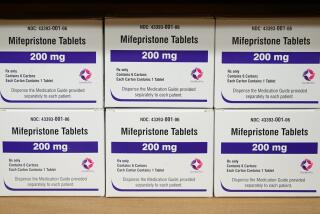Trouble getting pregnant? Check your cholesterol
For couples looking to conceive a baby, one key roadblock could be hiding in plain sight: high lipids circulating in the bloodstream of either partner.
High cholesterol readings, according to a study published Tuesday, are implicated in delayed conception among couples. And though either partner’s high circulating lipids were problematic, the effect was more powerful when the woman’s free cholesterol levels were found to be in worrisome territory.
The effect appears to be independent of body mass, a well-established obstacle for couples looking to conceive. High body mass index -- BMI, a rough measure of overall fatness -- often goes hand in hand with high levels of low-density lipoproteins (LDL, the “bad” cholesterol), and it largely did in this study as well. But the authors of the current study found that even among couples who were not overweight or obese, high “free cholesterol” was associated with a longer path to pregnancy.
The study appears in the Journal of Endocrinology and Metabolism.
The study enrolled 501 couples in Michigan and Texas who sought to become pregnant and followed each for a year. Most were college-educated non-Latino white couples. Though 100 couples withdrew from the study, largely because their pregnancy intentions changed, 347 of the couples became pregnant within the year, and the remainder did not. The average age of the women was 30, and they were trained to measure their periods of peak fertility.
Free cholesterol levels -- a rough index of “good” cholesterol (high-density lipoproteins) and bad cholesterol -- were highest in those couples who did not become pregnant within the year and lowest in couples who became pregnant relatively quickly.
Long before older age sets in, cholesterol readings associated with higher rates of atherosclerosis can disturb basic functions, the authors said. High cholesterol in women has been associated with poor egg quality and with poor sperm quality in men, so either partner’s unchecked cholesterol could drive down the prospects of a successful pregnancy.
“In addition to raising the risk of cardiovascular disease, our findings suggest cholesterol may contribute to infertility,” said one of the study’s authors, Enrique F. Schisterman of the National Institutes of Health’s Eunice Kennedy Shriver National Institute of Child Health and Human Development (NICHD) in Bethesda, Md. “Our results suggest prospective parents may want to have their cholesterol checked to ensure their levels are in an acceptable range.”







